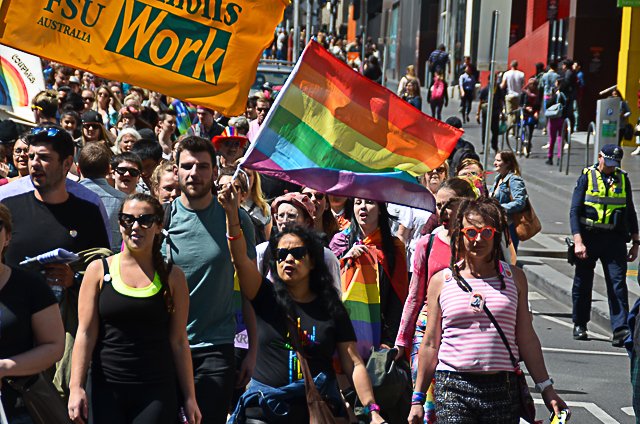
Labor and the Greens voted on October 11 to block the federal Coalition’s plebiscite on marriage equality.
The plebiscite was not popular within the LGBTI community, and it is not difficult to see why. It was clear that the right wing saw the plebiscite as an opportunity to hit the community exactly where it hurts the most. As part of their campaign for a "No" vote, they were planning a vicious attack on transgender youth. This is clear from the transphobic attacks on the Safe Schools program.
Understandably, many in the LGBTI community wanted to protect our youth. Yet, a minority of LGBTI people supported the plebiscite. Support in the community for marriage equality is now very strong.
I have no doubt in my mind that the plebiscite would have been won. It would have been a huge political opening to build a mass movement for marriage equality and demolish our opposition.
I shared people's fears that the “No” campaign would have hurt our youth. But on the other hand a strong “Yes” campaign led by youth would have empowered them, and protected people from the worst impacts of the “No” campaign.
Community leaders should not accommodate too much to people's tendency to retreat into a safe space. Don't get me wrong, I understand that a safe space is a human need. However, we will never win anything if we spend our whole lives in a safe space.
Also consider the lengths people have gone to already in the campaign for marriage equality. I have known young people who have risked parental rejection, physical violence, losing their jobs and the safety of their families to fight for LGBTI rights.
Yet not everyone is able to do things like that. Many people are just too traumatised. Some on the left have criticised opponents of the plebiscite as “cowardly”. It is insensitive, and not helpful for building solidarity in the queer movement, to slap people down like that when they are struggling just to survive, as many LGBTI people are.
On balance I was against the plebiscite mainly because of the problems with the proposed question: “Do you support a change in the law to allow same sex couples to marry?” This would have excluded many transgender and intersex people. The word “allow” is also pretty damn condescending. We do not need anybody's permission to exercise a basic civil right.
The plebiscite was a delaying tactic. It is high time for our parliament to just put the bill and pass it. Unfortunately the end of the plebiscite does not mean the end of the delaying tactics. Now that the plebiscite is off the table, the government will try to make us forget the issue completely. Every delay gives the right wingers more room to breathe. Every delay gives them more room to organise. And Labor has as much blood on its hands as the Liberal party in that regard.
With or without a plebiscite, the end game of the struggle for marriage equality is likely to get ugly. The right will probably mount further attacks, particularly on transgender youth, in the lead up to marriage equality legislation being passed. A plebiscite would have only formalised the battle. Even without a plebiscite we will need strong community solidarity to withstand the attacks to come.
So what comes next?
The community played a major role in defeating the plebiscite. Once again, we have proven our collective power.
I hope the community takes the campaign into its own hands and enforces real grassroots democracy in our movement. By that I mean open organising meetings where every decision is made by majority vote, intimidation tactics are not used, nobody stacks the meeting, and there are no bureaucratic manoeuvres from the chair.
If we can achieve community control of the campaign, we can achieve anything.
[Farida Iqbal is an activist in Save Safe Schools WA.]
Like the article? Subscribe to Green Left now! You can also like us on Facebook and follow us on Twitter.